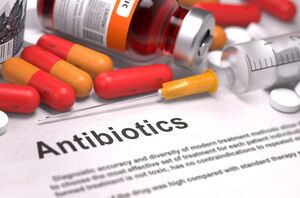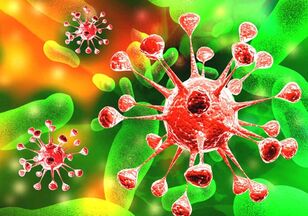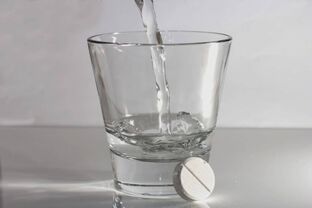Antibiotic therapy is the main treatment for prostatitis. Antibiotics for prostatitis are divided into several groups. The choice of a drug depends on the nature of the inflammatory process and the characteristics of the disease in the patient. Often pathogenic microorganisms are resistant to the active substance of the drug. In such cases, antibiotic therapy is selected taking into account the sensitivity of pathogens to certain active substances, and drugs are prescribed only after bacterial analysis of prostate water.
Why do you need antibiotics?

With the exacerbation of prostatitis is primarily the cessation of the inflammatory process. For this, antibacterial therapy is indicated, because only antimicrobial drugs can quickly eliminate the pathogenic agent that provokes the inflammatory process.
Symptomatic treatment without the use of antibacterial drugs is ineffective and gives only temporary results. Any anti-inflammatory, analgesic and antipyretic drug for prostatitis is used only in addition to antibiotic treatment.
Removal of disease agents allows:
- eliminate pain syndrome;
- normalize body temperature;
- improve urodynamics;
- To normalize the function of the prostate gland.
Antibiotics treat both symptoms and the cause of the disease.
The main advantage of antimicrobials is fast movement and ease of use. Antibiotic treatment of prostatitis is carried out using pills, injections or suppositories.
For medications to work really fast, you need to choose them according to your doctor's instructions. To determine the type of pathogenic microorganisms, it is necessary to undergo a series of tests, first of all - a bacterial study of the composition of the secretions of the prostate gland. Only the identification of the causative agent of the inflammatory process guarantees the selection of optimal drugs that will quickly eliminate the inflammation.
It is important to note that antibiotics for prostatitis are indicated for the treatment of both acute and chronic infectious forms of the disease. Its development is also incompatible with non-infectious inflammation associated with age-related changes or disorders of prostate trophism, the use of antimicrobial drugs, and adenoma.
Types of drugs
In the treatment of prostatitis, a wide range of drugs that are active against many pathogens are preferred. This choice is sometimes explained by the fact that prostatitis occurs as a result of simultaneous exposure to several types of pathogens.
The following medications are effective antibiotics for prostatitis:

- fluoroquinolones;
- cephalosporins;
- macrolides;
- tetracyclines;
- penicillins.
Each type of drug is effective only for certain groups of bacteria.
Each of the listed antibiotics for prostatitis is active against certain microorganisms. Drugs from different groups replace each other when inflammation is triggered by opportunistic microorganisms, such as E. coli.
Fluoroquinolones
Fluoroquinolone antimicrobial drugs are only conventionally called antibacterial drugs. In terms of pharmacological effects, these substances clearly show antibacterial activity, but are not antibiotics in their composition.
The main difference between fluoroquinolones and broad-spectrum antibiotics is their synthetic composition. Unlike antibiotics from the group of fluoroquinolones, penicillins or tetracyclines, there is no natural analogue. The main advantage of drugs in this group is that pathogenic agents are not resistant because there are no natural substitutes for the active substance, and treatment of chronic prostatitis with the antibiotic fluoroquinolone will be more effective.
Preparations of this group are active against most bacteria, including sexually transmitted infections (chlamydia, Trichomonas). Today, fluoroquinolone is the best drug for the treatment of bacterial prostatitis. Fluoroquinolones, which are subject to the right dosage and the right choice of drugs, have a rapid therapeutic effect and cause minimal adverse reactions compared to antibiotics. Drugs in this group are toxic, so it is important to follow the treatment regimen recommended by your doctor.
In chronic bacterial inflammation, drugs of this group are used for a long time for 3-4 weeks.
The list of drugs in the fluoroquinolone group is very extensive, so you should consult a specialist to choose the optimal drug. The regimen and duration of the course of treatment can be adjusted according to the doctor's prescription.
Penicillins
In most cases, doctors prescribe penicillin for the first episode of prostatitis. Such an antibiotic for prostatitis is well tolerated by the body and has a pronounced therapeutic effect by suppressing the activity of a number of opportunistic bacteria that cause inflammation of the prostate.
Most people are resistant to this group of drugs. This is because penicillins have been used to treat any bacterial inflammation for the past 50 years. To increase the therapeutic effect in men, the use of combined antibiotics for the treatment of prostatitis - these are drugs containing penicillins and clavulanic acid.
The use of combined drugs allows you to quickly achieve a therapeutic effect. These drugs are well tolerated, have little effect and are affordable, which makes them popular. Release forms include antibiotics, tablets and capsules, suppositories for prostatitis, solutions for intramuscular injection. Although injections of antibiotics can quickly stop inflammation, men prefer the dosage form of tablets because of their ease of application.
Doctors and patients talk well about these products, noting:
- declared antibacterial effect;
- convenient release form;
- reasonable price;
- minimum side effects.
Thanks to its clavulanate, the drugs penetrate directly into the tissues of the prostate gland.
Medications in this group are taken for three weeks. The maximum dosage is 1 g of active substance per day, equal to 1-2 tablets, depending on the form of release.
Often these drugs cause gastrointestinal disorders, which are manifested by diarrhea, nausea and stomach pain. To minimize the negative effects on the mucous membranes, you should consult your doctor about the appointment of probiotics.
Tetracyclines
The use of tetracycline antibiotics to treat prostatitis in men has declined in recent years. This is due to the large number of side effects and low intake of the active substance in the inflamed prostate tissue.
The advantage of drugs in this group is a clear activity against chlamydia and ureaplasma. The disadvantage is the negative impact on the gastrointestinal tract, a large number of individual intolerances and adverse reactions of the body.
Due to the risk of complications, you should not take this group of drugs alone. The treatment regimen and duration of therapy are chosen individually by the doctor.
Macrolides
Many people prefer macrolides when wondering which antibiotics can be taken for prostatitis. Drugs in this group are very common, especially in cases of ineffectiveness of other drugs, which occurs when pathogenic microorganisms become resistant.
Unlike other antibiotics, macrolides are less commonly used. These drugs are prescribed only for inflammation caused by chlamydia, ureaplasma and gonococcal infection.
Although the mechanism of action of these drugs on inflammatory prostate is not fully understood, the main advantages of these drugs are low toxicity and minimal side effects. This, along with a fairly reasonable cost, makes the drug a popular remedy for prostatitis in men.
The course of treatment depends on the severity of the inflammatory process and lasts an average of three weeks. Preparations of the macrolide group are produced in the form of tablets and injectable solutions, so they are not widely used among patients because of their extreme discomfort.
Cephalosporins
Cephalosporin antibiotics are one of the most effective drugs for bacterial prostatitis. The medication works quickly to relieve symptoms a few days after starting treatment. At an affordable price, the course of drug treatment will be cheap and affordable for everyone. The drugs are well absorbed by the body and have virtually no side effects, but there is one significant drawback - it is produced only in injectable solutions. Not everyone can inject themselves at home, so treatment with cephalosporins is usually done in a hospital.
The treatment regimen for prostatitis with these drugs is chosen by the doctor. Generally, 1 injection is prescribed per day for 7-14 days.
After examining the patient, the doctor decides which drug to choose. Drugs in this group are characterized by a broad spectrum of action, but are ineffective against chlamydia.
List of medicines on the tablet

It is best to treat prostatitis with pills or capsules at home. Popular drug groups in this release:
- penicillins;
- macrolides;
- fluoroquinolones;
- tetracyclines.
How to treat inflammation, as well as the duration and mode of the course - it depends on the dose of the drug and the form of the disease. Antibiotic treatment lasts 10-12 days for acute inflammation and three weeks for chronic inflammation.
It is recommended to take antibiotic tablets immediately after a meal. It is recommended to take the capsule at the same time every day. If the drug is used several times a day, the time intervals between doses should be the same.
Antibiotic Candles
Another convenient form of home treatment is rectal antibiotic suppositories.
The duration of treatment is 7-21 days, depending on the severity of symptoms. Often, in order to achieve the best therapeutic effect, doctors choose drugs with different active ingredients when prescribing the use of suppositories and antibiotics in tablets at the same time. This combination treatment allows you to stop the inflammatory process as soon as possible.
Candles are used once a day. They are placed rectally before bedtime.
Events
Any antibacterial drug has a number of contraindications. This list should be read before taking any medication. Absolute contraindications to taking any antibiotic:
- individual intolerance;
- acute renal failure;
- acute liver failure;
- taken simultaneously with alcohol.
The majority of adverse reactions to antibiotic therapy are from the gastrointestinal tract. These include intestinal dysbiosis, diarrhea, stomach pain, nausea and vomiting.
In case of adverse reactions in the body, it is allowed to replace the drug with another active ingredient. Prescribing fluoroquinolones to replace penicillin antibiotics with the development of side effects or intolerance to the latter is very common. However, analogues should be selected by a physician depending on the nature of the reaction to the drug.
































